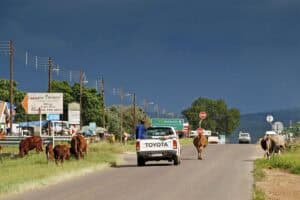One town scored a dismal 2 out of 100, which makes one wonder why anyone in Modimolle was even bothering at all.

SA’s municipal sector faces collapse as financial governance continues to deteriorate, says Ratings Afrika’s latest Municipal Financial Sustainability Index (MFSI) for 2018.
Unless corrective action is taken, a crisis is inevitable. And when service delivery is poor, violence is never far behind. Political leaders need to look at the interests of residents and businesses rather than their own, says the agency. They need to root out corruption, appoint managers with the right skills and experience, and apply sound budgetary practices and strict financial discipline.
Very little of this is in evidence in the latest MFSI.
“The current political leadership in control of the majority of municipalities has demonstrated over the last five years and more to not being capable of sound governance,” says Ratings Afrika. “This is the main cause of the deteriorating financial sustainability of the municipal sector in SA.”
Of the seven metros analysed by Ratings Afrika, Cape Town came out tops for financial sustainability. Joburg came last.
Both are DA-run, so gloating rights ahead of the national elections are severely curtailed.
Tshwane, too, looks like it needs a financial reboot with a working capital deficit of R3.2 billion. It’s also DA-run, but is starting to show signs of improvement, reporting a R336 million operating surplus in 2018.
Joburg reported a deficit of R250 million in 2018 and has suffered a deterioration in its MFSI score from 43 to 29 over the past five years.
Ratings Afrika analyst Leon Claassen says it is difficult to draw political inferences from these scores, since many municipalities and metros are grappling with long-standing legacy and debt issues. However, it is well known that the governing party in each jurisdiction stacks management with political appointees.
Drop in electricity sales for Joburg
An analysis of Joburg’s revenue shows electricity sales dropping by nearly R900 million to R13.5 billion – a decline of roughly 6%. Part of this would have been the result of electricity outages, but some of this is also certainly due to users switching to alternative energy sources. Non-payment is adversely affecting the working capital position of Johannesburg, which was R3 billion negative (shortfall) as at June 2018. Eskom’s annual report for the last year shows an arrears bill of nearly R17 billion in Soweto alone – this amount is not included in Johannesburg’s financial results.
Presenting the latest MFSI for 2018 on Tuesday, Claassen points out that only 23 of the top 100 municipalities in SA reported operating profits last year. The remaining 77 made combined operating losses of R13.3 billion and recorded a combined working capital shortfall of R23 billion. This means they have run out of cash and have stopped or delayed paying creditors.
Ratings Afrika’s MFSI uses a model that scores municipalities out of 100 based on operating performance, liabilities management, budget practices and liquidity.
Overall, the picture for municipalities is bleak and getting worse. The national average slipped below 40 to 38 for the first time since the index was calculated in 2012. Of the top 100 municipalities, 56 scored less than 35. Worst of the lot was Modimolle, formerly Nylstroom in Limpopo, which scored just 2 out of 100. It has virtually ceased to function and service delivery is almost non-existent – a recipe for protest and violence.
Redemption
Best of the lot is Swartland in the Western Cape with a score of 86. And herein lies a tale of redemption. When the index was first published in 2012, Swartland scored in the low 50s. After huffing and puffing about the low score, municipal managers asked what they should do to improve performance.
“It came down to making basic financial corrections, such as reining in expenses, no new hires, improving revenue collection and implementing proper budgeting,” says Claassen.
Another municipality on the mend is Midvaal in Gauteng, whose score has improved from 53 to 72 over the last five years. It has consistently won clean audits from the Auditor-General. In 2013 the ANC attempted to merge the DA-run Midvaal with the disastrous ANC-run Emfuleni in what was seen as a cynical attempt to capture the province’s best-run municipality. The attempted merger was defeated in the High Court in Johannesburg in 2015.
Moving in the opposite direction is Msunduzi in KwaZulu-Natal, which was once rated among the best-managed municipalities in the country. All that has gone as new management took over, squandered the reserves, and let revenue and arrears collections go to the dogs.
The political question
How much does politics play in the management of municipalities?
Ratings Afrika director Charl Kocks relates the story of one metro that soft-peddled on arrears collections so as not to lose votes ahead of an election. The obvious solution seems to be to get professional managers in to run the municipalities, rather than using them as playthings for dispensing political favours.
The main revenue source for metros and municipalities is electricity sales, followed by water charges, refuse and sewage charges, and property tax.
“Given that the financial sustainability of key local municipalities in SA is weak, our expectation is that the quality of service delivery is likely to deteriorate over the short to medium term,” says Ratings Afrika. “Weak service delivery impacts quality of living as well as the economic growth and development that are desperately needed to reduce unemployment in the country.”
What differentiates the high-scoring municipalities from the weak are skills, experience, financial discipline and quality of management backed by sound governance.
Brought to you by Moneyweb






